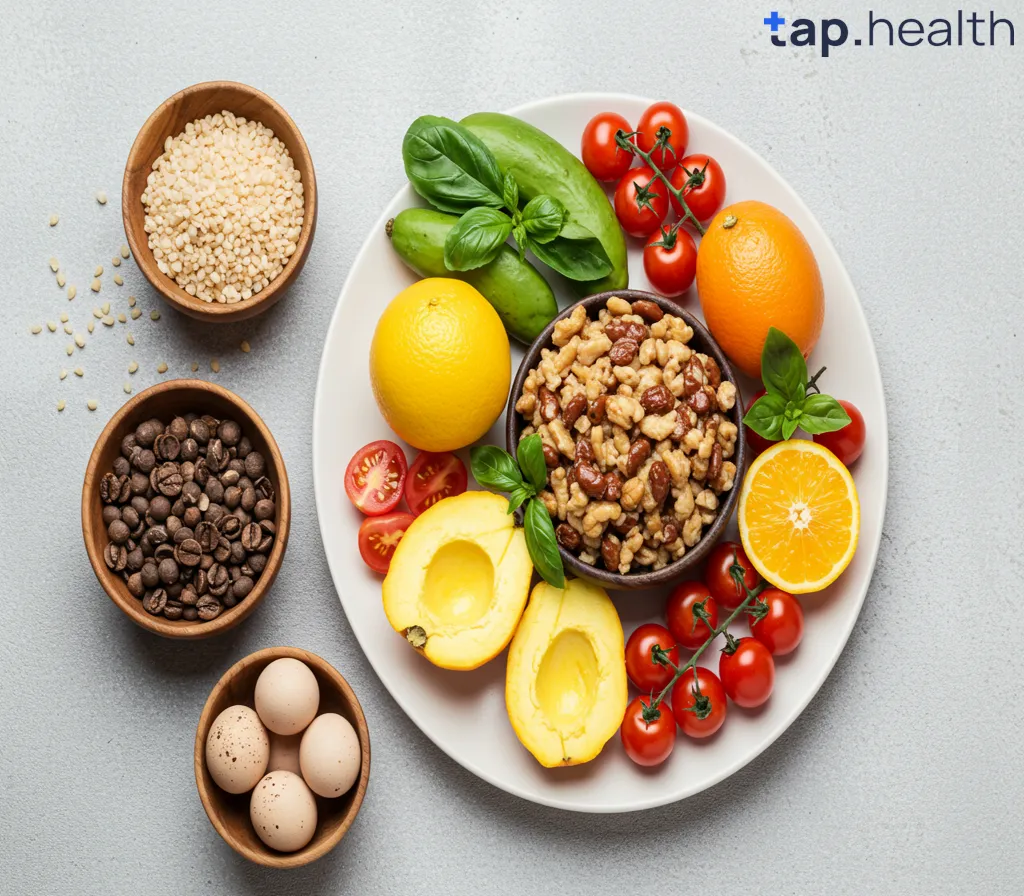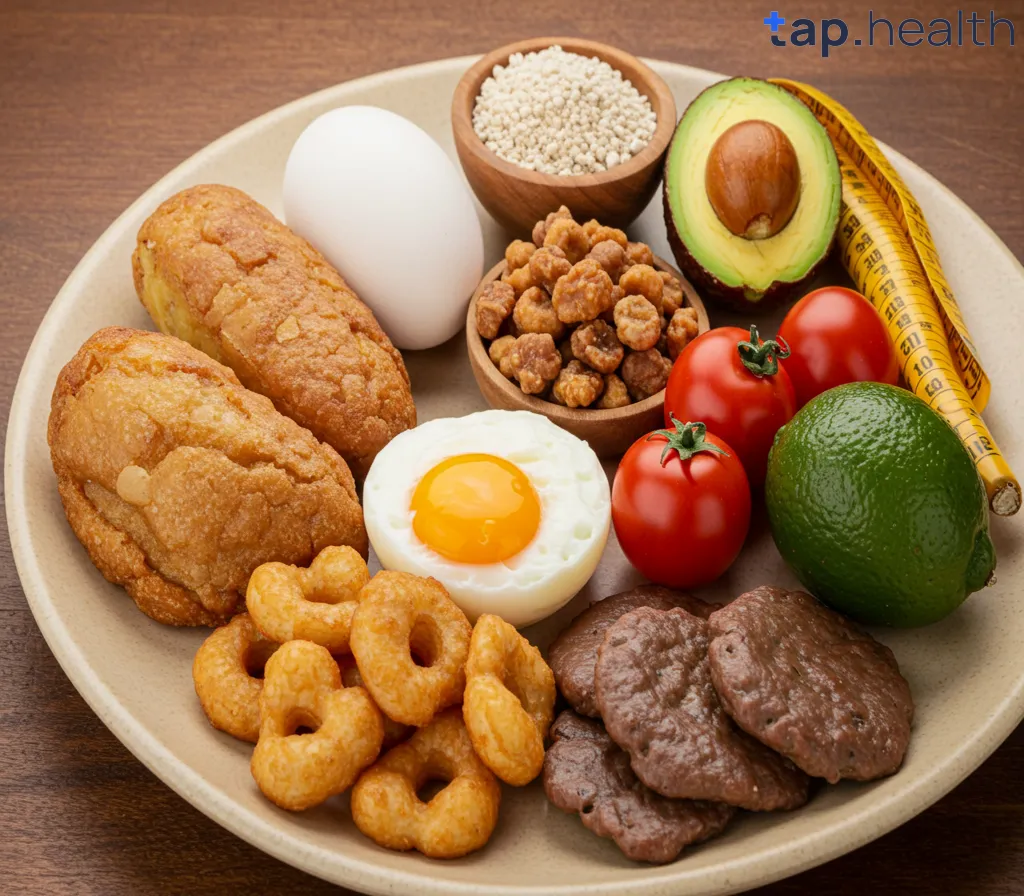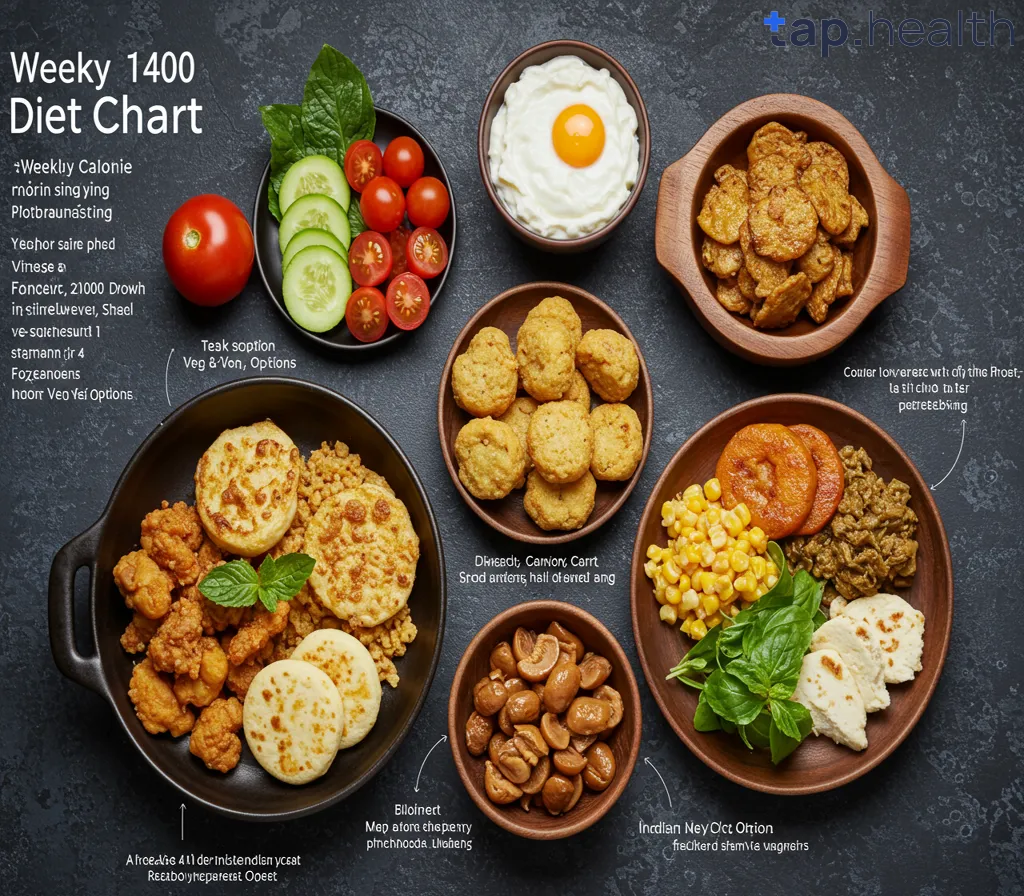When it comes to losing fat, one of the most important factors is controlling your calorie intake. Both a 1400-calorie diet and a 1200-calorie diet can help you achieve fat loss, but they work differently depending on your individual needs, activity levels, and health goals. Understanding which calorie count is better suited to your body and lifestyle is key to a sustainable fat loss journey.
In this blog post, we will explore the difference between a 1400-calorie diet and a 1200-calorie diet, specifically in the context of an Indian diet plan. We will look at the pros and cons of each approach, how they impact fat loss, and which one might be more effective for you depending on your goals and circumstances.
What Is the Difference Between a 1400-Calorie and a 1200-Calorie Diet?
The primary difference between a 1400-calorie diet and a 1200-calorie diet lies in the number of calories consumed, which directly impacts the rate at which you lose fat. Both diets create a caloric deficit, which is required for fat loss, but the degree of the deficit varies:
- 1200-Calorie Diet: This is considered a low-calorie diet for most people. It results in a larger caloric deficit and faster fat loss, but it can be more difficult to maintain, especially if you have a higher activity level. It is typically recommended for those with a smaller body mass or lower daily energy expenditure.
- 1400-Calorie Diet: This is a moderate-calorie diet that still creates a caloric deficit but is less restrictive than a 1200-calorie plan. It provides more flexibility and ensures that you’re getting enough nutrients, which makes it easier to stick to over time. It’s suitable for those who want to lose fat but also maintain energy levels for exercise and daily activities.
Which Diet Is Better for Fat Loss?
1. 1200-Calorie Diet for Fat Loss
A 1200-calorie diet is often recommended for quick weight loss or for individuals who have a lower metabolic rate or smaller body size. It creates a larger caloric deficit, which results in faster fat loss. However, it is more restrictive, and maintaining energy levels can be challenging for some individuals.
Pros of the 1200-Calorie Diet:
- Faster fat loss: A larger caloric deficit will likely result in faster weight loss, especially for individuals with lower activity levels.
- Suitable for smaller body types: If you have a smaller body size or lower muscle mass, a 1200-calorie diet might be more appropriate.
- Focus on portion control: A 1200-calorie diet encourages mindful eating and portion control, which can help develop healthier eating habits.
Cons of the 1200-Calorie Diet:
- Harder to maintain: A 1200-calorie diet can feel restrictive, and many people struggle to stay on track long-term, which may lead to binge eating or yo-yo dieting.
- Risk of nutrient deficiency: With fewer calories, you may not be getting all the necessary nutrients, especially if the food choices aren’t well-planned.
- Reduced energy levels: It may leave you feeling low on energy, which can impact your workout performance and daily activities.
2. 1400-Calorie Diet for Fat Loss
A 1400-calorie diet is slightly less restrictive but still effective for fat loss. It provides more flexibility and ensures you have enough energy for daily activities and exercise. The 1400-calorie diet is often more sustainable for active individuals and those with a moderate calorie requirement.
Pros of the 1400-Calorie Diet:
- Easier to maintain: Because it’s less restrictive than a 1200-calorie diet, it’s easier to stick to for longer periods.
- Sufficient energy for exercise: A 1400-calorie diet ensures you have enough energy to perform workouts and engage in physical activities without feeling drained.
- Nutrient-dense options: It’s easier to incorporate a variety of nutrient-dense foods, like vegetables, whole grains, and protein, without feeling deprived.
- Sustainable fat loss: Although the weight loss might be slower compared to a 1200-calorie diet, it’s generally more sustainable and helps maintain muscle mass.
Cons of the 1400-Calorie Diet:
- Slower fat loss: A smaller caloric deficit will lead to a slower rate of fat loss, which might not be ideal for individuals seeking rapid results.
- Potential for overeating: With slightly more calories, there’s a possibility of overeating or consuming higher-calorie foods that could impede fat loss if not managed well.
1400-Calorie vs 1200-Calorie Diet: Which Is Right for You?
The right calorie count for fat loss depends on several factors, such as age, gender, activity level, and goals. Here are some considerations to help you choose between a 1200-calorie diet and a 1400-calorie diet.
1. Activity Level
- Low activity level: If you’re mostly sedentary or have a desk job, a 1200-calorie diet might be more effective for fat loss. However, ensure that your meals are nutrient-dense to avoid feeling sluggish or weak.
- Moderate to high activity level: If you’re regularly exercising, especially if you’re doing strength training or intense workouts, a 1400-calorie diet might be a better choice. This will provide enough energy for your workouts without compromising fat loss.
2. Metabolism and Body Type
- Smaller body size or slower metabolism: If you have a smaller body type or a slower metabolism, the 1200-calorie diet might be more suitable for you as it creates a larger caloric deficit.
- Larger body size or faster metabolism: If you’re larger or have a higher metabolism, the 1400-calorie diet might provide a better balance between fat loss and energy.
3. Sustainable Fat Loss
If your goal is to lose fat in a healthy and sustainable manner, a 1400-calorie diet is often a better long-term choice. This allows for a slower, steady weight loss, which is more sustainable than rapid fat loss, which can lead to muscle loss and nutritional deficiencies.
4. Nutrient-Dense Foods
Regardless of whether you choose a 1200-calorie or 1400-calorie diet, it’s important to focus on nutrient-dense foods. Ensure that your meals include plenty of fiber, lean proteins, healthy fats, and complex carbs to maintain overall health while losing fat.
Sample 1400-Calorie Indian Diet Plan for Fat Loss
Here’s an example of a 1400-calorie Indian diet plan that focuses on low-calorie, nutrient-dense foods perfect for fat loss.
Day 1 – 1400 Calorie Indian Meal Plan
Breakfast (300 Calories)
- 1 boiled egg (70 calories)
- 1 small bowl of oats with almond milk and 1 tablespoon chia seeds (150 calories)
- 1 small banana (80 calories)
Mid-Morning Snack (100 Calories)
- 1 small handful of almonds (100 calories)
Lunch (400 Calories)
- 1 small bowl of mixed vegetable curry (spinach, carrots, peas) (150 calories)
- 1 small whole wheat roti (80 calories)
- 1 small serving of dal (lentils) (150 calories)
Afternoon Snack (100 Calories)
- 1 small cup of Greek yogurt (unsweetened) (100 calories)
Dinner (500 Calories)
- 1 small grilled chicken breast or tofu (200 calories)
- 1 small serving of quinoa (150 calories)
- 1 small side of steamed broccoli (50 calories)
- 1 teaspoon olive oil for cooking (50 calories)
FAQs: Common Questions About the 1400 vs 1200 Calorie Diet for Fat Loss
1. Which diet is better for faster fat loss, 1200 or 1400 calories?
A 1200-calorie diet generally leads to faster fat loss because it creates a larger caloric deficit. However, it might be harder to maintain in the long term and could lead to a loss of muscle mass. A 1400-calorie diet results in slower fat loss but is more sustainable.
2. Can I follow a 1200-calorie diet if I work out?
While it’s possible to follow a 1200-calorie diet and work out, it’s important to ensure you’re getting enough nutrients to fuel your workouts and support recovery. For more intense exercise routines, a 1400-calorie diet may be better as it provides more energy.
3. Which diet helps in maintaining muscle mass while losing fat?
A 1400-calorie diet is more likely to help you maintain muscle mass while losing fat. The slightly higher calorie intake supports energy levels for workouts and muscle recovery, reducing the risk of muscle loss.
4. Can I alternate between a 1200 and 1400-calorie diet?
Yes, alternating between a 1200-calorie and 1400-calorie diet can provide flexibility, but it’s essential to focus on balanced, nutrient-dense meals to ensure you’re getting adequate nutrition for your goals.
Conclusion
Choosing between a 1200-calorie and 1400-calorie diet depends on your personal goals, body type, and activity level. While the 1200-calorie diet may offer faster fat loss, it can be harder to sustain. On the other hand, a 1400-calorie diet provides a better balance of nutrients and is more sustainable for long-term fat loss and overall health. Make sure to focus on nutrient-dense foods, portion control, and regular physical activity to see the best results for your fat loss journey.




